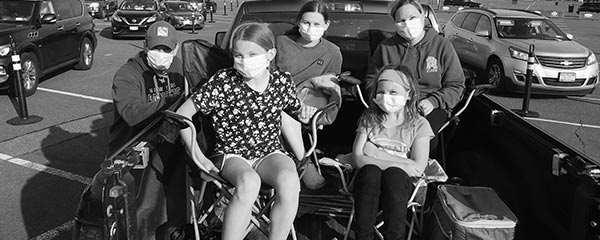Story Highlights
- Concerns also run high for rising costs of insurance and healthcare
- Broad support for government negotiation of cost of COVID-19 treatment
- Over half rate the U.S. response to COVID-19 as fair or poor
This article concerns research conducted in partnership with West Health, a family of nonprofit and nonpartisan organizations focused on lowering healthcare costs for seniors and on the rising cost of healthcare in the U.S.
WASHINGTON, D.C. -- A new study by West Health and Â鶹´«Ã½AV finds Americans sensitive to a number of negative developments in healthcare that could result from the COVID-19 pandemic. Nearly nine in 10 U.S. adults are "very" (55%) or "somewhat" (33%) concerned that the pharmaceutical industry will leverage the COVID-19 pandemic to raise drug prices. The levels of concern among demographic groups are mostly similar, except by party identification. Democrats (66%) are more likely to say they are very concerned than are independents (52%) or Republicans (49%).
| U.S. total | Democrats | Independents | Republicans | ||||||||||||||||||||||||||||||||||||||||||||||||||||||||||||||||||||||||||||||||||||||||||||||||
|---|---|---|---|---|---|---|---|---|---|---|---|---|---|---|---|---|---|---|---|---|---|---|---|---|---|---|---|---|---|---|---|---|---|---|---|---|---|---|---|---|---|---|---|---|---|---|---|---|---|---|---|---|---|---|---|---|---|---|---|---|---|---|---|---|---|---|---|---|---|---|---|---|---|---|---|---|---|---|---|---|---|---|---|---|---|---|---|---|---|---|---|---|---|---|---|---|---|---|---|
| % | % | % | % | ||||||||||||||||||||||||||||||||||||||||||||||||||||||||||||||||||||||||||||||||||||||||||||||||
| Very concerned | 55 | 66 | 52 | 49 | |||||||||||||||||||||||||||||||||||||||||||||||||||||||||||||||||||||||||||||||||||||||||||||||
| Somewhat concerned | 33 | 28 | 35 | 35 | |||||||||||||||||||||||||||||||||||||||||||||||||||||||||||||||||||||||||||||||||||||||||||||||
| Not at all concerned | 12 | 5 | 13 | 16 | |||||||||||||||||||||||||||||||||||||||||||||||||||||||||||||||||||||||||||||||||||||||||||||||
| Â鶹´«Ã½AV-West Health Cost of Healthcare Study, May 2020 | |||||||||||||||||||||||||||||||||||||||||||||||||||||||||||||||||||||||||||||||||||||||||||||||||||
These results are based on completed surveys with 1,016 U.S. adults as a part of an ongoing special study by Â鶹´«Ã½AV and to assess U.S. public opinion on the cost of healthcare. Interviews were conducted May 11-22, 2020.
In addition to concerns over rising drug prices, Americans are also concerned -- to a somewhat lesser extent -- about rising health insurance premiums and the cost of care generally. Overall, 79% are very or somewhat concerned about their health insurance premiums rising and 84% are very or somewhat concerned about the cost of care generally rising, with 41% very concerned about each. The three questions asked were:
-
How concerned are you that the pharmaceutical industry will take advantage of the current COVID-19 pandemic to increase drug prices?
-
How concerned are you that the care required to treat COVID-19 patients will result in increased health insurance premiums next year?
-
How concerned are you that the U.S. health system will take advantage of the current COVID-19 pandemic to increase the cost of care?
| Rising drug prices | Rising insurance premiums | Rising healthcare costs | ||||||||||||||||||||||||||||||||||||||||||||||||||||||||||||||||||||||||||||||||||||||||||||||||||
|---|---|---|---|---|---|---|---|---|---|---|---|---|---|---|---|---|---|---|---|---|---|---|---|---|---|---|---|---|---|---|---|---|---|---|---|---|---|---|---|---|---|---|---|---|---|---|---|---|---|---|---|---|---|---|---|---|---|---|---|---|---|---|---|---|---|---|---|---|---|---|---|---|---|---|---|---|---|---|---|---|---|---|---|---|---|---|---|---|---|---|---|---|---|---|---|---|---|---|---|---|
| % | % | % | ||||||||||||||||||||||||||||||||||||||||||||||||||||||||||||||||||||||||||||||||||||||||||||||||||
| U.S. TOTAL | 55 | 41 | 41 | |||||||||||||||||||||||||||||||||||||||||||||||||||||||||||||||||||||||||||||||||||||||||||||||||
| Gender | ||||||||||||||||||||||||||||||||||||||||||||||||||||||||||||||||||||||||||||||||||||||||||||||||||||
| Women | 57 | 46 | 48 | |||||||||||||||||||||||||||||||||||||||||||||||||||||||||||||||||||||||||||||||||||||||||||||||||
| Men | 52 | 37 | 33 | |||||||||||||||||||||||||||||||||||||||||||||||||||||||||||||||||||||||||||||||||||||||||||||||||
| Race | ||||||||||||||||||||||||||||||||||||||||||||||||||||||||||||||||||||||||||||||||||||||||||||||||||||
| Nonwhite | 59 | 47 | 50 | |||||||||||||||||||||||||||||||||||||||||||||||||||||||||||||||||||||||||||||||||||||||||||||||||
| White | 52 | 38 | 36 | |||||||||||||||||||||||||||||||||||||||||||||||||||||||||||||||||||||||||||||||||||||||||||||||||
| Annual household income | ||||||||||||||||||||||||||||||||||||||||||||||||||||||||||||||||||||||||||||||||||||||||||||||||||||
| Less than $40,000 | 57 | 49 | 46 | |||||||||||||||||||||||||||||||||||||||||||||||||||||||||||||||||||||||||||||||||||||||||||||||||
| $40,000-<$100,000 | 51 | 37 | 40 | |||||||||||||||||||||||||||||||||||||||||||||||||||||||||||||||||||||||||||||||||||||||||||||||||
| $100,000+ | 56 | 41 | 38 | |||||||||||||||||||||||||||||||||||||||||||||||||||||||||||||||||||||||||||||||||||||||||||||||||
| Party ID | ||||||||||||||||||||||||||||||||||||||||||||||||||||||||||||||||||||||||||||||||||||||||||||||||||||
| Democrats | 66 | 49 | 47 | |||||||||||||||||||||||||||||||||||||||||||||||||||||||||||||||||||||||||||||||||||||||||||||||||
| Independents | 52 | 39 | 43 | |||||||||||||||||||||||||||||||||||||||||||||||||||||||||||||||||||||||||||||||||||||||||||||||||
| Republicans | 49 | 37 | 32 | |||||||||||||||||||||||||||||||||||||||||||||||||||||||||||||||||||||||||||||||||||||||||||||||||
| Â鶹´«Ã½AV-West Health Cost of Healthcare Study, May 2020 | ||||||||||||||||||||||||||||||||||||||||||||||||||||||||||||||||||||||||||||||||||||||||||||||||||||
Differences in key demographic groups are more readily apparent with concerns over rising costs of health insurance and care generally. Nearly half of women (48%), for example, are very concerned about the general cost of care rising, compared with 33% of men. Also, 50% of nonwhites are very concerned, compared with 36% of whites. Across all three measures, Democrats report the highest levels of concern by political identity.
Extensive Support for Government Negotiation of COVID-19 Drug Price
Amid significant concerns about how the COVID-19 pandemic could cause a rise in prices for drugs, insurance and healthcare, a large majority of Americans support direct negotiations by the federal government with the drug manufacturer on the price of a treatment for the disease itself. Nearly nine in 10 (88%) respondents support such an approach, with little differences based on political identity. Significant support exists across all major demographic groups.
| Supports government negotiation | Opposes government negotiation | |||||||||||||||||||||||||||||||||||||||||||||||||||||||||||||||||||||||||||||||||||||||||||||||||||
|---|---|---|---|---|---|---|---|---|---|---|---|---|---|---|---|---|---|---|---|---|---|---|---|---|---|---|---|---|---|---|---|---|---|---|---|---|---|---|---|---|---|---|---|---|---|---|---|---|---|---|---|---|---|---|---|---|---|---|---|---|---|---|---|---|---|---|---|---|---|---|---|---|---|---|---|---|---|---|---|---|---|---|---|---|---|---|---|---|---|---|---|---|---|---|---|---|---|---|---|---|
| % | % | |||||||||||||||||||||||||||||||||||||||||||||||||||||||||||||||||||||||||||||||||||||||||||||||||||
| U.S. TOTAL | 88 | 11 | ||||||||||||||||||||||||||||||||||||||||||||||||||||||||||||||||||||||||||||||||||||||||||||||||||
| Party ID | ||||||||||||||||||||||||||||||||||||||||||||||||||||||||||||||||||||||||||||||||||||||||||||||||||||
| Democrats | 91 | 7 | ||||||||||||||||||||||||||||||||||||||||||||||||||||||||||||||||||||||||||||||||||||||||||||||||||
| Independents | 87 | 12 | ||||||||||||||||||||||||||||||||||||||||||||||||||||||||||||||||||||||||||||||||||||||||||||||||||
| Republicans | 89 | 11 | ||||||||||||||||||||||||||||||||||||||||||||||||||||||||||||||||||||||||||||||||||||||||||||||||||
| Â鶹´«Ã½AV-West Health Cost of Healthcare Study, May 2020 | ||||||||||||||||||||||||||||||||||||||||||||||||||||||||||||||||||||||||||||||||||||||||||||||||||||
Over Half Rate U.S. Response to COVID-19 as Fair or Poor
Concurrent with large-scale support for government pricing negotiation for COVID-19 treatment, evaluations of how the U.S. has responded to the outbreak itself are tepid. When asked to rate the national response to COVID-19 relative to how much the U.S. spends on healthcare, 9% of respondents rate the U.S. response as excellent and another 14% as very good. In contrast, 34% rate the response as poor and 23% as fair.
These evaluations are highly inversely related to both education and income. Among those with postgraduate education, for example, 72% evaluate the response as fair or poor, compared with just 15% who evaluate it as excellent or very good. Political identity also greatly informs perspectives, with 84% of Democrats evaluating the response as fair or poor, compared with 28% of Republicans.
| Excellent/Very good | Good | Fair/Poor | ||||||||||||||||||||||||||||||||||||||||||||||||||||||||||||||||||||||||||||||||||||||||||||||||||
|---|---|---|---|---|---|---|---|---|---|---|---|---|---|---|---|---|---|---|---|---|---|---|---|---|---|---|---|---|---|---|---|---|---|---|---|---|---|---|---|---|---|---|---|---|---|---|---|---|---|---|---|---|---|---|---|---|---|---|---|---|---|---|---|---|---|---|---|---|---|---|---|---|---|---|---|---|---|---|---|---|---|---|---|---|---|---|---|---|---|---|---|---|---|---|---|---|---|---|---|---|
| % | % | % | ||||||||||||||||||||||||||||||||||||||||||||||||||||||||||||||||||||||||||||||||||||||||||||||||||
| U.S. TOTAL | 23 | 20 | 57 | |||||||||||||||||||||||||||||||||||||||||||||||||||||||||||||||||||||||||||||||||||||||||||||||||
| Education | ||||||||||||||||||||||||||||||||||||||||||||||||||||||||||||||||||||||||||||||||||||||||||||||||||||
| Postgraduate | 15 | 12 | 72 | |||||||||||||||||||||||||||||||||||||||||||||||||||||||||||||||||||||||||||||||||||||||||||||||||
| College graduate | 15 | 19 | 65 | |||||||||||||||||||||||||||||||||||||||||||||||||||||||||||||||||||||||||||||||||||||||||||||||||
| Some college | 24 | 19 | 56 | |||||||||||||||||||||||||||||||||||||||||||||||||||||||||||||||||||||||||||||||||||||||||||||||||
| High school or less | 27 | 24 | 49 | |||||||||||||||||||||||||||||||||||||||||||||||||||||||||||||||||||||||||||||||||||||||||||||||||
| Annual household income | ||||||||||||||||||||||||||||||||||||||||||||||||||||||||||||||||||||||||||||||||||||||||||||||||||||
| Less than $40,000 | 23 | 24 | 53 | |||||||||||||||||||||||||||||||||||||||||||||||||||||||||||||||||||||||||||||||||||||||||||||||||
| $40,000-<$100,000 | 26 | 18 | 56 | |||||||||||||||||||||||||||||||||||||||||||||||||||||||||||||||||||||||||||||||||||||||||||||||||
| $100,000+ | 19 | 14 | 66 | |||||||||||||||||||||||||||||||||||||||||||||||||||||||||||||||||||||||||||||||||||||||||||||||||
| Party ID | ||||||||||||||||||||||||||||||||||||||||||||||||||||||||||||||||||||||||||||||||||||||||||||||||||||
| Democrats | 6 | 10 | 84 | |||||||||||||||||||||||||||||||||||||||||||||||||||||||||||||||||||||||||||||||||||||||||||||||||
| Independents | 20 | 23 | 57 | |||||||||||||||||||||||||||||||||||||||||||||||||||||||||||||||||||||||||||||||||||||||||||||||||
| Republicans | 44 | 25 | 28 | |||||||||||||||||||||||||||||||||||||||||||||||||||||||||||||||||||||||||||||||||||||||||||||||||
| Â鶹´«Ã½AV-West Health Cost of Healthcare Study, May 2020 | ||||||||||||||||||||||||||||||||||||||||||||||||||||||||||||||||||||||||||||||||||||||||||||||||||||
Implications
The intersection between the COVID-19 pandemic and the rising cost of healthcare has created wide-ranging ramifications for Americans. Prior West Health/Â鶹´«Ã½AV polling has shown that 14% of Americans experiencing COVID-19 symptoms have been unwilling to seek treatment because of the cost of care, a percentage that is only partially reduced even when infection by the coronavirus is suspected. Two-thirds of Americans, in turn, report an increase in the cost of prescription drugs since 2017, while only 31% report that the Trump administration has made "a great deal" or "a fair amount" of progress on addressing the rising costs of drugs. And 23% report that they lacked the money at least once in the past 12 months for needed prescription drugs. Against this backdrop, the significant concerns about the potential for higher drug prices, health insurance premiums and healthcare as a whole in the wake of the pandemic are understandable.
As Americans brace for a potential second wave of coronavirus infections later this year, leaders would be advised to note that it is not just fear of infection or job loss that is causing concern but also fear of increased costs of prescription drugs, insurance premiums and healthcare generally. Elected officials may as a result consider policy decisions that are designed to curtail these possibilities, assuaging public fears.




